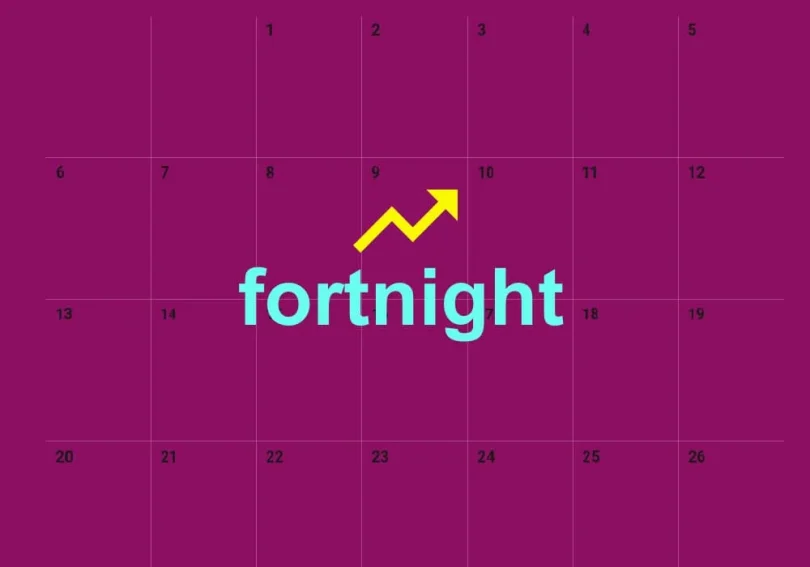Ever wondered what people mean when they say "a fortnight"? You're not alone. It's one of those words that sounds like it belongs in an old English novel or maybe even a Shakespearean play. But trust me, it's still kicking around in modern conversations, and understanding it could save you from some awkward moments. So, buckle up because we're diving deep into the world of fortnights, and by the end of this, you'll be dropping "fortnight" in your sentences like a pro.
A fortnight might sound fancy, but it's actually pretty straightforward once you get the hang of it. Think of it as a time unit that’s just two weeks long. Yep, that’s it. But why does it have such a quirky name? And why do people still use it today? Well, stick around because we’re about to break it all down for you in a way that’s as easy as pie.
Whether you’re planning a vacation, setting deadlines, or just trying to sound smarter in casual conversations, knowing how long a fortnight is can come in handy. So, let’s dig into the history, the math, and even some fun facts about this fascinating little time chunk. Ready? Let’s go!
Read also:Addisson Lorie
What Exactly is a Fortnight?
Alright, so let’s get the basics out of the way. A fortnight is simply a period of two weeks. The word itself comes from Old English, where "fort" means "fourteen" and "night" refers to "days." So, essentially, a fortnight is fourteen nights or, in simpler terms, fourteen days. Now, wasn’t that easy?
But here’s the thing: while we’ve largely replaced "fortnight" with "two weeks" in modern English, it’s still widely used in certain regions, especially in the UK, Australia, and India. So, if you ever find yourself in a conversation with someone from these parts of the world, don’t be surprised if they casually throw "fortnight" into the mix.
Why Do We Still Use the Word Fortnight?
Good question. The word "fortnight" has been around for centuries, and despite its somewhat outdated vibe, it’s managed to stick around. One reason is tradition. In many cultures, especially those with strong ties to British English, the word has become ingrained in everyday language.
Another reason is its precision. While "two weeks" works just fine, "fortnight" carries a certain charm and specificity that makes it stand out. Plus, let’s be honest—it sounds cooler than just saying "two weeks," right?
Fortnight in Different Cultures
While the concept of a fortnight is universal, its usage varies across cultures. In some parts of the world, it’s a common term, while in others, it might raise a few eyebrows. Let’s explore how different cultures perceive and use this quirky time unit.
In the UK, for instance, "fortnight" is part of the everyday lexicon. You’ll often hear people say things like, "I’ll be back in a fortnight" or "The festival runs for a fortnight." In Australia and New Zealand, it’s also pretty standard, especially in formal settings like business or education.
Read also:Diva Flawless Unveils New Sex Videos A Deep Dive
Fortnight in Modern English
Interestingly, the use of "fortnight" has seen a resurgence in recent years, thanks in part to the global popularity of the game "Fortnite." While the game’s name is a playful take on "fortnight," it’s introduced the word to a whole new generation of gamers and tech enthusiasts.
So, whether you’re a fan of the game or not, chances are you’ve heard the word "fortnight" more often than you might think. And who knows? Maybe this little time unit will make a full comeback in the near future.
How to Calculate a Fortnight
Now that we know what a fortnight is, let’s talk about how to calculate it. It’s pretty simple, really. A fortnight is always fourteen days, no matter how you slice it. But here’s where things can get a little tricky: depending on how you count, a fortnight can start and end on different days.
- If you start counting on a Monday, your fortnight will end on a Sunday.
- If you start on a Wednesday, it’ll end on a Tuesday.
- And so on.
See? It’s all about when you start your count. But don’t worry—most people don’t get too hung up on the specifics. As long as you’re talking about a two-week period, you’re good to go.
Common Misconceptions About Fortnights
There are a few misconceptions floating around about fortnights that are worth clearing up. For starters, some people think a fortnight is always a calendar month. Nope. A calendar month can vary from 28 to 31 days, so it’s not the same thing.
Another common misunderstanding is that a fortnight is only used in formal settings. Wrong again! While it does have a formal ring to it, "fortnight" is perfectly fine to use in casual conversations too.
Historical Significance of Fortnights
Fortnights have been around for a long time, and they’ve played an important role in various cultures throughout history. In ancient times, people often used lunar cycles to measure time, and a fortnight conveniently matched half a lunar cycle.
Even today, in some rural communities, fortnights are used to schedule events and festivals. It’s a practical way to organize time without getting bogged down by calendars or clocks.
Fortnights in Literature
One of the most fascinating aspects of fortnights is their frequent appearance in literature. From Shakespeare to Dickens, many famous authors have used the word to add a touch of authenticity to their stories.
For example, in "Great Expectations," Charles Dickens writes, "I was to remain at Miss Havisham’s for a fortnight." This kind of detail helps ground the story in a specific time and place, making it more relatable to readers.
Practical Uses of Fortnights
So, how can you use fortnights in your everyday life? Well, the possibilities are endless. Here are a few practical examples:
- Planning vacations: If you’re booking a two-week trip, why not call it a fortnight getaway? Sounds way more exciting, right?
- Setting deadlines: Whether you’re working on a project or trying to meet a personal goal, using fortnights can help you stay organized.
- Counting down: Need to count down to a special event? Use fortnights to break it into manageable chunks.
See? Fortnights aren’t just for old-school conversations. They’re a versatile tool that can add a bit of flair to your daily life.
Fun Facts About Fortnights
Before we wrap up, let’s dive into some fun facts about fortnights:
- The word "fortnight" has been in use since at least the 13th century.
- In some parts of the world, "fortnight" is still used in official documents and legal contracts.
- Fortnights are often used in scientific research to measure time intervals in studies.
Isn’t it amazing how much history and culture is packed into this little word?
Conclusion: Embrace the Fortnight
So, there you have it—everything you need to know about fortnights. From its origins in Old English to its modern-day usage, this quirky little time unit has stood the test of time. Whether you’re planning a trip, setting deadlines, or just trying to sound smarter in conversations, knowing how long a fortnight is can be incredibly useful.
Now, it’s your turn. Share this article with your friends, drop "fortnight" into your next conversation, and let us know how it goes. And if you’re craving more knowledge, be sure to check out our other articles on all things time-related. Until next time, happy fortnighting!
Table of Contents
- What Exactly is a Fortnight?
- Why Do We Still Use the Word Fortnight?
- Fortnight in Different Cultures
- How to Calculate a Fortnight
- Common Misconceptions About Fortnights
- Historical Significance of Fortnights
- Fortnights in Literature
- Practical Uses of Fortnights
- Fun Facts About Fortnights
- Conclusion: Embrace the Fortnight


